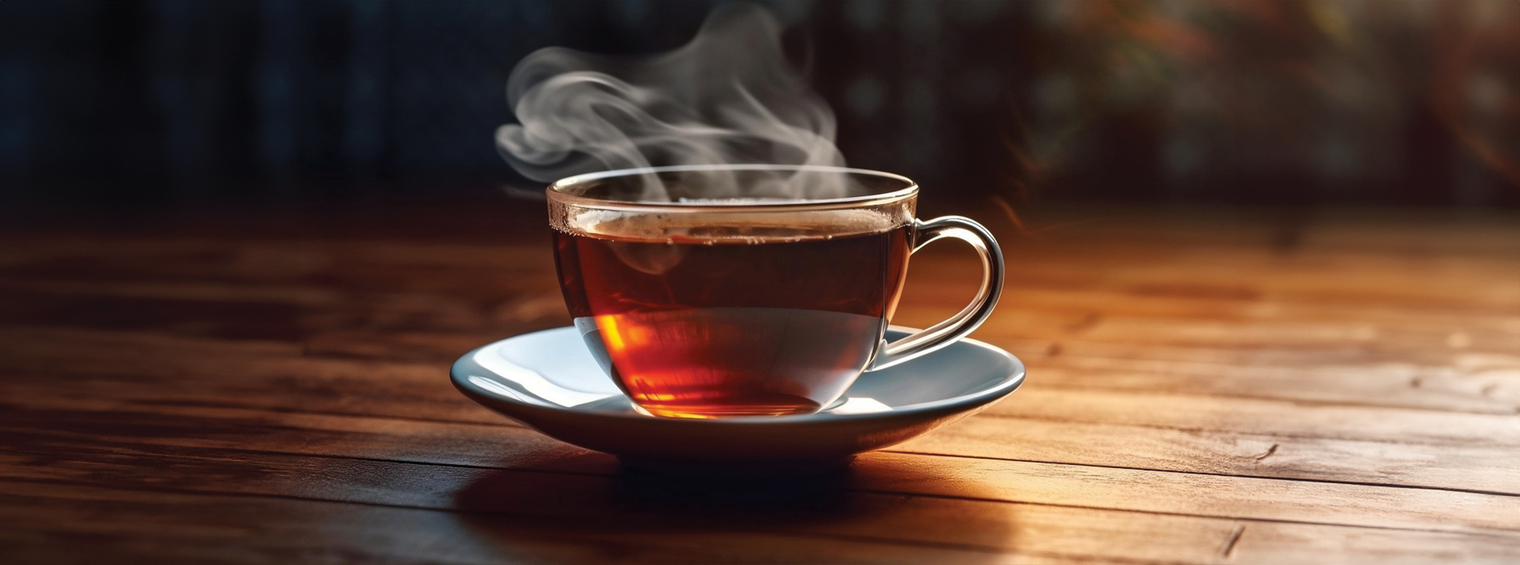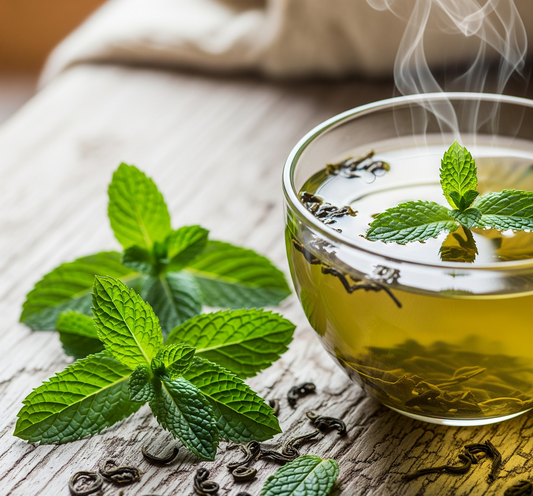Black tea contains 14-90 mg of caffeine per cup, averaging 47 mg. Factors like tea quality, processing, and brewing affect levels. Black tea has more caffeine than green tea. Decaf black tea has 2-5 mg per cup. While black tea provides a caffeine boost, it has less than coffee. Enjoy black tea's rich flavor and health benefits, but monitor intake if sensitive to caffeine.
Are you a tea enthusiast who is curious about the caffeine content in your favorite brew? Well! You’ve come to the right place. In this comprehensive blog, we'll dive deep into the world of black tea and finally answer the secrets behind the question “How much caffeine is in a cup of black tea?”. Whether you're a caffeine connoisseur or simply want to make an informed choice, this article has got you covered.
Quick Answer: Black tea contains 14-90 mg of caffeine per cup, averaging 47 mg. Factors like tea quality, processing, and brewing affect black tea caffeine levels. Black tea has more caffeine than green tea. Decaf black tea has 2-5 mg per cup. While black tea provides a sustained caffeine boost, it has less caffeine than coffee.
Black tea is a beloved beverage known for its robust flavor and energizing properties. A key aspect of this energizing effect is the caffeine in Black Tea. Understanding the caffeine levels in black tea can help you make informed decisions about your consumption, especially if you're sensitive to caffeine or monitoring your intake.
Understanding Caffeine in Tea
While you might assume that caffeine is only found in coffee, it is a natural stimulant that is found in various plants, including the Camellia Sinensis plant, which is the source of all true teas such as black, green, oolong, and white. According to Healthline, this magical compound works by blocking the action of adenosine, a brain chemical that promotes sleep. As a result, caffeine helps you feel more alert and energized.
 But how much caffeine are we talking about here exactly? Well, the amount of caffeine in tea can vary depending on several factors! These include the type of tea, the processing method, and the brewing technique.
But how much caffeine are we talking about here exactly? Well, the amount of caffeine in tea can vary depending on several factors! These include the type of tea, the processing method, and the brewing technique.
Sustained Caffeine in Tea
Unlike coffee, which delivers a quick jolt of energy followed by a crash, black tea provides a more balanced and sustained caffeine release. This is due to the presence of L-theanine, an amino acid that slows the absorption of caffeine and promotes calm alertness.
When you drink black tea, caffeine binds with tannins (natural compounds found in tea), resulting in a gradual release of energy over several hours. This means you can stay focused and energized without the sudden spike and crash associated with caffeine in coffee.
 Additionally, the combination of caffeine and L-theanine helps enhance mental clarity, improve concentration, and reduce jitters, making black tea an excellent choice for those seeking a steady and smooth energy boost throughout the day.
Additionally, the combination of caffeine and L-theanine helps enhance mental clarity, improve concentration, and reduce jitters, making black tea an excellent choice for those seeking a steady and smooth energy boost throughout the day.
You can read more about Black Tea caffeine and Coffee caffeine in this blog: A Deeper Look Into Caffeine In Black Tea Vs Coffee
Want a balanced caffeine kick? Try our premium organic black tea from Nepal Tea Collective!
Let's take a closer look at black tea specifically.
Black Tea: The Bold and Caffeinated Choice
Black tea is a type of tea that undergoes a process called oxidation. Oxidation involves exposing the leaves to air and enzymes. It transforms the leaves from green to a dark, reddish-brown color that black tea is often associated with and gives black tea its signature bold and robust flavor.
Now, let's get to the meat of the matter: How much caffeine in 1 cup of Black tea. According to Good Food, an average cup (237 ml) of black tea contains around 47 mg of caffeine. However, it can range anywhere from 14 to 70 mg, depending on the specific tea and brewing method. It should be noted that some studies have found that a cup of black tea can contain as much as 90 mg of caffeine.
 To put this into perspective, a typical cup of coffee contains around 95 mg of caffeine. So given these metrics, while black tea packs quite a punch, it still contains less caffeine than coffee and is considered safe for most adults, as the FDA recommends no more than 400 mg of caffeine per day.
To put this into perspective, a typical cup of coffee contains around 95 mg of caffeine. So given these metrics, while black tea packs quite a punch, it still contains less caffeine than coffee and is considered safe for most adults, as the FDA recommends no more than 400 mg of caffeine per day.
Factors Affecting Caffeine in Black Tea
Several factors influence the caffeine content in black tea. Let’s explore some of them in more detail:
Tea Leaf Quality
The quality of the tea leaves used can significantly impact the caffeine content. Generally, younger leaves and buds contain higher levels of caffeine compared to older - more mature leaves. This is why premium black teas, such as Darjeeling and Assam, often have a higher caffeine content than lower-grade teas.
Processing Method
The processing method used to create black tea can also affect its caffeine content. During the oxidation process, some of the caffeine may be lost or transformed into other compounds. How it is stored may also impact caffeine levels. However, the exact impact on caffeine levels is not well-documented.
Brewing Time and Temperature
The length of the steep and the temperature of the water also play a role in caffeine levels. The longer you steep your black tea and the hotter the water, the more caffeine will be extracted from the tea leaves. A steeping time spanning one-minute extracts about a quarter of the caffeine, while a five-minute steep extracts one-half to three-quarters of caffeine.
Tea Bag vs. Loose Leaf
Tea bags typically contain broken or fanned tea leaves, which have a larger surface area exposed to water. This means that tea bags can release more caffeine into the water compared to whole-leaf tea.
Bring home a pack of premium organic black tea from Nepal Tea Collective today!
Caffeine in Black Tea vs. Green Tea
When it comes to caffeine content, black tea generally tends to have more than green tea. A typical cup of black tea contains around 47 milligrams of caffeine, while green tea has about 28 milligrams. However, these levels can vary depending on factors ranging from tea variety, processing method, and brewing technique.
Black tea leaves are fully oxidized, which increases their caffeine content. Green tea leaves on the other hand, are heated to halt oxidation, preserving their green color and resulting in lower caffeine levels. Factors like brewing time and temperature also affect caffeine extraction.
While black tea has more caffeine, both teas provide a gentle, lasting energy boost due to the synergy between caffeine and L-theanine, a natural amino acid found in tea. The type of tea you choose is a matter of personal preference, as both offer health benefits from their antioxidant content.
Choose from a range of premium organic green tea from Nepal Tea Collective.
Decaf Black Tea: A Low-Caffeine Option
If you're looking to reduce your caffeine intake but still want to enjoy the rich flavor of black tea, decaf black tea is a great option. Decaffeinated black tea undergoes a process that removes most of the caffeine, typically leaving less than 2 mg of caffeine per cup.
It's important to note that while decaf black tea has significantly less caffeine than regular black tea, it's not entirely caffeine-free. If you're extremely sensitive to caffeine or have specific health concerns, it's always best to consult with a healthcare professional before making any changes to your diet or caffeine intake.
How Much Caffeine is in Decaf Black Tea?
Decaffeinated black tea offers a delightful way to enjoy your tea without getting the jitters. Decaffeinated black tea is not completely caffeine-free, it contains around 2 to 5 milligrams of caffeine per 8 oz cup. In comparison, the same cup of regular, non-decaffeinated black tea contains around 40 to 70 mg of caffeine. The decaffeination process removes most of the caffeine, but a small - minuscule amount makes it through the process. Providing a gentle boost without the buzz.
Drinking decaf black tea allows you to savor the rich flavors of black tea and enjoy its health benefits, like antioxidants without any of the side effects. Whether you sip it in the morning or relax and unwind in the evening, decaf tea remains a soothing choice of beverage.
In conclusion, a cup of black tea contains around 47 mg of caffeine on average, ranging from 14 to 90 mg depending on various factors. While this is less than a typical cup of coffee, it's still a significant amount of caffeine that should be considered, especially for those sensitive to its effects.
Remember, the caffeine content in tea can vary, so it's always a good idea to pay attention to your own body's reactions and adjust your intake accordingly. Whether you prefer black tea, green tea, or decaf, the most important thing is to enjoy your tea and stay hydrated!
FAQ
How does the caffeine content in black tea compare to coffee?
A typical 8-ounce cup of black tea contains about 50 milligrams of caffeine, while coffee has around 95 milligrams per cup. Although black tea has less caffeine than coffee, it still provides a gentle energy boost.
Is black tea a good alternative to coffee for an energy boost?
Yes, black tea provides a steady energy boost due to the combination of caffeine and L-theanine, which promotes alertness without the jittery effects associated with coffee.
How much black tea can I drink per day?
The FDA recommends a daily caffeine intake of no more than 400 milligrams, which is equivalent to about 7–8 cups of black tea. However, individual tolerance levels vary, so it's best to monitor how your body reacts.
Does cold brew black tea have the same caffeine content as hot brewed tea?
Cold brew black tea generally has slightly less caffeine because it is steeped in cold water over a longer period, resulting in a smoother and less intense extraction.
About the Author
Nishchal Banskota is the founder of Nepal Tea Collective, dedicated to offering the finest Nepali teas. With years of experience in the tea industry, Nishchal is passionate about sharing the culture and craftsmanship of Nepali tea with the global tea industry. Learn more about Nepal Tea Collective and explore a variety of award-winning teas that bring you closer to the heart of Nepal.
Sources:




